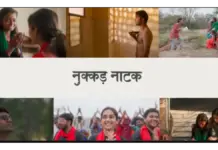UTV Motion Pictures and Pictureshuru Entertainment’s Jagga Jasoos (UA) is the story of detective Jagga, narrated like a musical opera.
Jagga (Ranbir Kapoor) is a detective, who studies in school. An orphan, he has been raised by Tooti Footi Bagchi (real name Badal Bagchi; Saswata Chatterjee). Right from childhood, Jagga has been stammering. As a child, Bagchi had explained to him that those who stammer while talking don’t stammer while singing, and so, he should sing to express himself uninhibitedly. In fact, Jagga has gotten over his problem to a large extent by singing more than talking.
Unknown to little Jagga, Bagchi had been an eyewitness to arms being airdropped at Purulia in West Bengal. In fact, it was soon after witnessing the airdrop of arms by illegal arms dealer Bashir Alexandra that Bagchi had been seriously injured by the wrongdoers and saved by little Jagga. Bagchi had adopted Jagga soon after recovering. Bagchi had gone away after some time, promising to return.
But years had passed and Bagchi hadn’t returned. Jagga’s only connection with Bagchi over the years had been the annual wishes which the latter used to send him on his birthday. Jagga had grown up to be a handsome young lad who was a sharp detective.
One day, Jagga meets Shruti Sengupta (Katrina Kaif), a journalist by profession. Shruti has written a couple of articles against illegal arms trading and is being hunted by the arms traders. Her fiancé, also a journalist, had to pay with his life for exposing the arms mafia. Shruti has come to Jagga’s town from Calcutta in connection with the arms story and has, therefore, put her life in further danger. She is framed for a crime she didn’t commit, and Jagga comes as a saviour in her life. Shruti is so indebted to Jagga for coming to her rescue when she was arrested that she promises to help him if he ever needed her.
It is Jagga’s birthday and for the first time in many years, the postman doesn’t bring Bagchi’s wishes. Jagga is sad and fearful about Bagchi’s well-being. And then comes the news that Bagchi is dead. Intelligence officer Sinha (Saurabh Shukla), for whom Bagchi used to work, had actually ordered his men to kill Bagchi after he (Bagchi) had delivered a VHS cassette which would expose the illegal arms dealers. But in a case of mix-up, Bagchi had delivered the tape containing his birthday wishes for Jagga, to Sinha. An exasperated Sinha is sure that the VHS cassette with the incriminating evidence would be with Jagga and so he contacts him. But Jagga does not have the tape. In his meeting with Sinha, Jagga gets a clue which convinces him that Bagchi isn’t dead.
He takes Shruti and goes to foreign land Mombaka in search of Bagchi whom he considers his father. He takes Shruti along because like Bagchi, Shruti is also clumsy, and Jagga has seen that Shruti makes the same mistakes as Bagchi used to make when he (Jagga) was a kid. This similarity as also the fact that both, Bagchi and Shruti, are born unlucky convince Jagga that Shruti would prove to be an asset in tracking Bagchi.
From Mombaka, Jagga and Shruti go to Sundi in search of Bagchi. They are shocked to see that Sundi is the hub of illegal arms trading. The arms mafia is busy replacing Christmas goodies, meant to be airdropped by the Pope, with guns and other arms and ammunitions. Jagga resolves to stop this and expose the illegal arms trade while tracing his father.
Do Jagga and Shruti succeed in their mission? Does Jagga unite with Bagchi?
Anurag Basu’s story is different from the usual romantic or even detective films. This is designed as a fantasy drama and written like an opera. And that is the unfortunate part – because fantasies are often not accepted by the audience, and a musical opera is almost an alien concept for the Indian viewers. The structure of the story and the screenplay (also written by Anurag Basu) is such that they don’t reveal everything in one go. Who is Bagchi, whom does he work for, who is Sinha, why did Sinha ask his men to kill Bagchi, who is Bashir Alexandra – all these questions are answered much after they crop up in the minds of the audiences. The drama, therefore, tests the viewers’ patience because nobody enjoys watching a film with so many questions remaining unanswered for a long time. Perhaps, the most terrible part of the story and screenplay is that Jagga sings while he speaks and so do several other characters while interacting with him. Even this experiment may have worked if the singing was used within bearable limits and if the film was not made on such a huge canvas. But to expect the audience to lap up so much singing and senseless rhyming, that too, in a big film such as this, is nothing but foolhardiness. What’s more, the drama seems to be so stretched that the viewer actually feels exasperated and completely helpless.
Since Jagga is much younger than Shruti, there is no romantic angle between them through most of the film. The comedy is kiddish and so, it may be liked by only the kid audience. Emotions totally fail to touch the heart.
Samrat Chakraborty’s dialogues are hardly funny. As for the song-dialogues, penned jointly by Amitabh Bhattacharya, Anurag Basu, Samrat Chakraborty and Debatma Mandal, they are not half as interesting as they should’ve been.
Ranbir Kapoor acts ably and sincerely but he ought to realise that if he continues to associate with such trash subjects as Jagga Jasoos (and Bombay Velvet, Besharam etc.), even his fantastic acting will not win him fans. Rather, he may lose his fan following if he doesn’t select the right script. One more point – Ranbir has been made to stutter way too much for the first alphabet, making it look gimmicky rather than natural. Katrina Kaif is cute and performs well. But a few of her dialogues are not dubbed in her voice. It is an ear-sore to find her dialogues in the same scene dubbed partly by her and partly by a dubbing artiste! Saswata Chatterjee is very good as Tooti Footi Bagchi or Badal Bagchi. Saurabh Shukla fails to impress, probably due to uninteresting characterisation. Master Saravajeet Tiwari has his moments as little Jagga. Nawazuddin Siddiqui has nothing to do except make an appearance in the final scene. Chitrak Bandopadhyay (as Debu), Sayani Gupta, Md. Sarwar Mir, Denzil Smith, Bijou Thaangjam, Rajatava Dutta and the others lend the necessary support.
Anurag Basu’s direction leaves a lot to be desired. What comes out loud and clear in the film is his over-indulgence. He has committed a blunder by making an ‘opera film’, that too, at an investment of around Rs. 125 crore (including promotion and marketing)! This is one very expensive experiment which will cost him and all the others associated with it dear. Pritam’s music is very good. Two songs – ‘Galti se mistake’ and ‘Ullu ka pattha’ – are very well-tuned. A couple of other songs are good. Amitabh Bhattacharya’s lyrics are so-so. The picturisations of ‘Galti se mistake’ and ‘Ullu ka pattha’ songs are eye-filling but because the rest of the film is so bad, the choreography (by Shiamak Davar; additional choreography by Vijay Ganguly and Ruel Dausan Varindani) looks like a mismatch. Pritam’s background music could’ve been better. S. Ravi Varman’s cinematography is splendid. Locations are simply terrific. Allan Amin’s action scenes are good. Production designing (by Rajat Poddar and Parijat Poddar) is of a fine standard. Ajay Sharma’s editing ought to have been sharper. Frankly, so much footage is used to establish things that major chunks of the film could have been deleted to advantage.
On the whole, Jagga Jasoos is a very costly experiment and a classic case of over-indulgence in a film which hardly has audience to lap it up. It is a terrible waste of resources and it should never have been made in the first place – at least and definitely not at the cost at which it has been made. At the box-office, the film will prove to be a major debacle and will be remembered as a blot on the reputations of all the people connected with it.




























